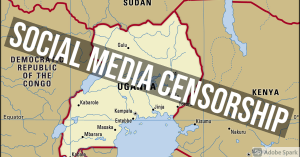Many countries do not have the levels of free speech that the USA once so openly had. In fact, many will quickly shut down any speech considered potentially of an incendiary nature. As such, Reuters reports that Uganda has shut down all social media in the follow up to her election.
Uganda ordered internet service providers to block all social media platforms and messaging apps on Tuesday until further notice, a letter from the country’s communications regulator seen by Reuters said.
Users had complained earlier on Tuesday that they were unable to access Facebook and WhatsApp, social media platforms being widely used for campaigning ahead of Thursday’s presidential election in the East African country.
“Uganda Communications Commission hereby directs you to immediately suspend any access and use, direct or otherwise, of all social media platforms and online messaging applications over your network until further notice,” said the letter from the commission’s executive director to internet providers.
The commission’s spokesman Ibrahim Bbossa and government spokesman Ofwono Opondo did not answer calls requesting comment. An aide to Minister of Information Judith Nabakooba said she was unable to comment at the moment.
A source in Uganda’s telecom sector said the government had made clear to executives at telecoms companies that the social media ban was in retaliation for Facebook blocking some pro-government accounts.
The U.S. social media giant said on Monday it had taken down a network in Uganda linked to the country’s ministry of information for using fake and duplicate accounts to post ahead of this week’s election. (source)
Twitter harshly criticized the move on her platform.
Why do I bring up this statement? Not just for the purposes of irony- with Twitter and other big technology companies deplatforming President Trump -but that what Uganda is doing has arguably been empowered by Twitter’s actions.
Let me make it clear that I am not saying there is a direct relationship between Twitter’s actions and Uganda’s actions. That is at best a theory that would need more proof to fully ascertain. What I am saying is that, well, actions have consequences, direct or indirect.
The US, like it or not, values freedom of speech not simply for purposes of license, but that it sets a standard for the world to look up to. While Twitter and other social media companies were in the legal right to deplatform Trump, as a principle they set a very dangerous standard for the future, suggesting that if the President of the most powerful nation in the world can be shut down and “shut out” of an Internet voice based on his views, then the same can happen to anybody. This is just on a domestic level.
Internationally, seeing that in the eyes of another nations “America” can shut down people for saying something that is not considered popular, this empowers those nations already inclined to dictatorial rule to follow through with their own clampdowns and to use the treatment of President Trump as an excuse. However, it will not be their presidents who suffer, but the common people.
I want to say again that there is no proof of a connection between Trump’s last week and Uganda’s actions. However, it would not be unreasonable to think that if a person in favor of this censorship was asked about it in a critical way, that he might point to what happened to Trump as an example of why censorship is good, and that ‘if you can do it to your president why can’t we do it here?’.
Actions have consequence, for good or for worse, and how we live our lives not only affects ourselves, but those whoa are around us. Trump said a lot of things, but did not deliver on his promises, and replaced promises with strong words that polarized before even a hit of realizing his promised. That is the great disappointment of his presidency- it was one of promised but failed potential exchanged for temporary political banter to the long-term loss of the great many.
Now, Trump has been censored, and understandably so in some cases, especially from a legal-business viewpoint looking out solely for their own protection. However, regardless of what one thinks or the motivations, the effect has been the legitimization of increasingly old-world styles of censorship and social casting out that damage not only the reputation of the United States, but encourage the worst behaviors among other nations. It is not a step forward, but rather a step backward, a regression towards ways of thinking that are tribalistic and lead to conflict instead of to understanding.
Uganda is a small nation, and while important in her region in Africa, is not going to have a real impact on world politics. But it is not about how small a nation is, rather, but how her actions can influence others. Given the current social climate in the US, inclining to division and rather just open chaos with censorship instead of the image that America has carefully cultivated of free speech, we may be witnessing the beginning of a larger trend of normalizing censorship of all things around the world, going from an era where the Internet liberated people intellectually more than ever before in history, to perhaps the greatest imprisonment of the human mind and free speech with the Internet and the heavy hand of authority as dual enforcement agents.



